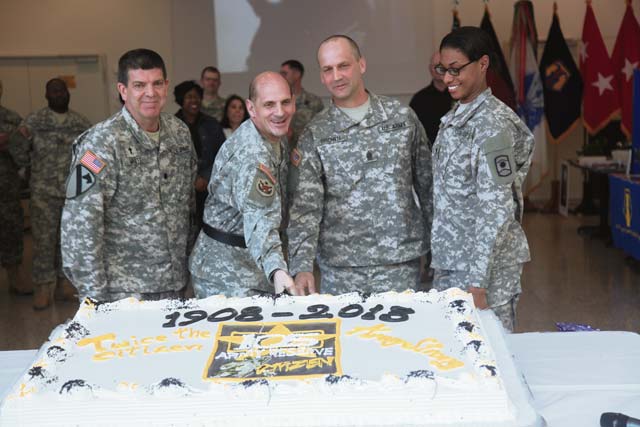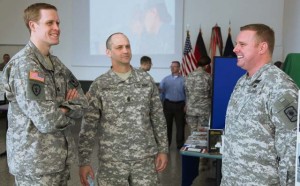Story and photos by Sgt. 1st Class Matthew Chlosta
7th Civil Support Command Public Affairs

The U.S. Army Reserve’s 7th Civil Support Command hosted a ceremony Tuesday at the Kaiserslautern Military Community Center food court to recognize and celebrate the U.S. Army Reserve’s 105th birthday.
Soldiers from various 7th CSC units also conducted equipment demonstrations, established informational display tables and answered questions from patrons.
For more than 100 years, the USAR has been, at times, a strategic force, and after Operation Iraqi Freedom it has shifted to become an enduring operational force. The force was originally called the Medical Reserve Corps when it was signed into law by President Theodore Roosevelt.
According to www.usar.army.mil, the National Defense Act of June 3, 1916, established the Officers Reserve Corps, then on June 4, 1920, the NDA established the Organized Reserve.
USAR Soldiers have been deployed to and participated in every major U.S. war and engagement from the Mexican “Punitive” Expedition in 1916 to World War I from 1917 to 1918 and World War II from 1941 to 1945.
Staff Sgt. Brett Fry, 7th CSC network operations specialist, served four years in the regular Army and nine months as an Army Reserve Soldier. For the last seven years, he has served on active duty as part of Active Guard and Reserve program.

“The U.S. Army Reserves is a great opportunity for people to serve their country,” he said. “In addition to that, the U.S. Army Reserve is an integral part of the U.S. Army and cyber defense.”
According to www.usar.army.mil, the Organized Reserve was redesignated as the Organized Reserve Corps on March 25, 1948. The Korean War (1950 to 1953) saw more than 240,000 Army Reserve Soldiers called to active duty. More than 70 Army Reserve units served in Korea.
“In the AGR program and the U.S. Army Reserves, in general, the duty positions are more diverse than in the regular Army,” Fry said.
On July 9, 1952, Congress officially established the USAR and the Organized Reserve was deactivated. The USAR also deployed significant amounts of Soldiers to the Vietnam War, the Gulf War, Desert Shield/Desert Storm, to Bosnia-Kosovo, and to Operations Enduring Freedom and Iraqi Freedom.
“A good analogy of how the U.S. Army Reserve works is the volunteer fire department,” said Brig. Gen. Paul M. Benenati, commanding general of the 7th CSC, in a speech before cutting the Army Reserve birthday cake with the youngest and oldest Soldiers in the 7th CSC.
During his remarks Benenati said that during World War II, U.S. Army Reserve Soldiers liberated Kaiserslautern, the local German town where 7th CSC is currently headquartered on Daenner Kaserne.
“Now, the Army Reserve is a valuable, indispensable part of the Army,” Benenati said.
In today’s asymmetrical and ambiguous warfare environment where there are less visible front lines, the 7th CSC mission is focused on foreign consequence management in the event of a humanitarian crisis in Europe or Africa.
“I think that the Army Reserve is very important. It’s kind of the best of both worlds,” said Spc. David Phinney, a human resource specialist with the 406th Human Resource Company, 7th CSC. “It gives a person an opportunity to do what they love to do in and outside of the military. One-hundred-and-five years of an opportunity like that is a really great thing.”


